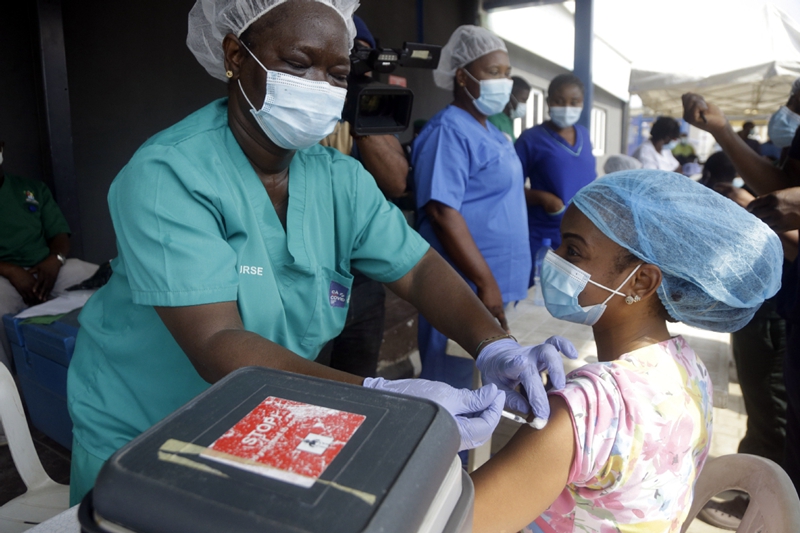Imperative vaccine divide narrowed

A medical worker receives a COVID-19 vaccine at a hospital in Lagos, Nigeria, on March 12. Supplies were provided under the COVAX initiative. [Photo/Agencies]
As the COVID-19 pandemic is still raging across the world, the imbalance in the distribution of vaccines — with the developed countries far outpacing developing countries in their vaccination drives — is becoming ever more acute. This parlous state of affairs is almost entirely due to the lack of global and moral responsibility on the part of those developed countries capable of producing COVID-19 vaccines.
Only 0.2 percent of vaccine doses administered so far have gone to low-income countries, according to the World Health Organization. "On average, in high-income countries, almost one-in-four people have received a vaccine. In low-income countries, it's one in more than 500," WHO Director-General Tedros Adhanom Ghebreyesus said early this month.
The situation has prompted former United Kingdom prime minister Gordon Brown to warn that the world is witnessing deadly "vaccine apartheid".
"Immunizing the West but only a fraction of the developing world is already fueling allegations of 'vaccine apartheid', and will leave COVID-19 spreading, mutating and threatening the lives and livelihoods of us all for years to come," he said.
The United States passed a major vaccine milestone on Sunday, with about 130 million Americans — half its adult population — having received at least the first jab.
Yet the contribution it has made to the global fight against the pandemic has obviously not matched its status as the world's sole superpower and home to the Pfizer, Moderna and Johnson & Johnson vaccines.
The White House has reiterated that its primary focus is on vaccinating the American people. Although its press secretary Jen Psaki recently denied media reports about the country's export prohibitions on COVID-19 vaccines, European Commission President Ursula von der Leyen has called for more openness on the vaccines, believing that the US and the UK have systems in place that effectively blocked the export of the vaccines.
Which explains why India, which is currently experiencing the worst surge in coronavirus infections and in urgent need of vaccines, is asking the US to lift a ban on exports of vaccine raw materials.
China has set a good example by striking a balance between helping other countries with the fight against the pandemic and having its own people inoculated. More than 200 million doses of COVID-19 vaccines have been administered across China, while it has taken concrete actions to make vaccines a global public good — by donating 10 million vaccines to the global vaccine sharing program of COVAX, and providing vaccine aid to more than 50 developing countries and exporting them to nearly 30 countries.
Developed countries should follow suit if they don't want the vaccine divide to widen, which would be to their detriment as well.